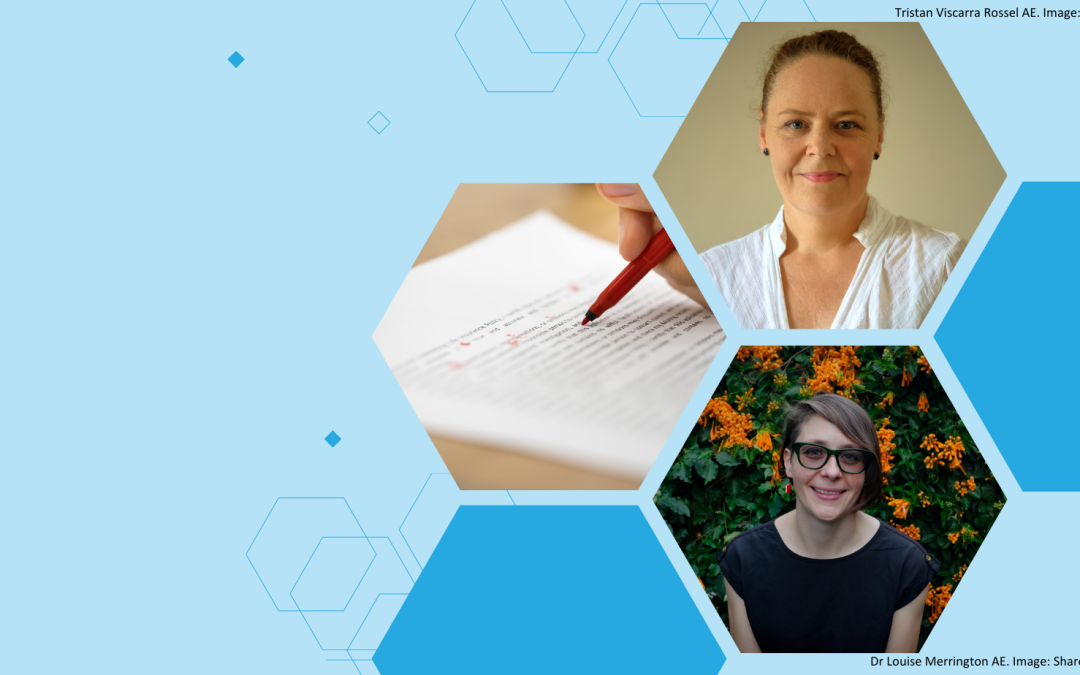by Paul Anderson
Professional editors Dr Louise Merrington AE and Tristan Viscarra Rossel AE were our guest speakers for an online panel discussion hosted by EdNSW on 5 September 2023. Both work as editors for Australian Government departments – with the Australian Public Service (APS), that is – and both are highly experienced. Dr Kai Jensen AE, EdNSW’s Presentations Coordinator, moderated the discussion, during which Louise and Tristan imparted much helpful advice for editors who may be seeking work in this sector.
How did the panellists get their starts?
Tristan “sort of fell into government editing” when she moved to Canberra in 2008. “Not knowing [at first] anything about the complexity of [government] procurement”, she was directed by a friend to a recruitment agency who contracted out government editing work. Tristan signed up and initially proofread ministerial correspondence.
Louise was foremost a writer who subsequently “learned to edit in government”. She joined Defence in 2011 as an employee and worked as an analyst for 18 months before moving to the Defence Intelligence Organisation’s editing and publication division. This proved to be a “really great experience, [particularly] learning to give feedback to writers … working fast, under pressure, because sometimes we had to get stuff out very quickly …” (the shooting down of Malaysia Airlines flight MH17 in 2014 was one example of a crisis event she cited).
Some pathways to government work for freelance editors
- Labour-hire contracts with agencies
“It’s extremely difficult to get paid by the government directly as a freelance editor,” Tristan said. She explained how the easiest pathway for a government buyer to recruit an editor is through a labour-hire contract. The agencies who hold these contracts are the government’s “first point of call when they need [external] editorial services or a content designer”. The agency pays the editor (and the government pays the agency). The editor is paid a pre-agreed rate (including superannuation), a rate based on the equivalent APS level position in-house, less the agency’s cut. Tristan has got much of her government work over the years this way. She named four such agencies during the discussion.
- Subcontracting through consultancies
“Some of the other pathways are a little trickier”, Tristan went on to say. One way is to “align yourself to a consultancy who’s on [an Australian Government] panel.” These panels are essentially long lists of businesses that have been pre-qualified to provide services to government after “rigorous procurement assessment[s]”. These panels “last about three years” and, although they are not a guarantee of work, it is nevertheless a good idea to align yourself with such a consultancy as “sole traders [and individual] freelancers don’t usually sit on those panels”. Louise has got most of her government work this way since she started her own editing business.
- Government-adjacent organisations
One other way Louise has found government (or adjacent) work is through peak bodies and non-profits. “They’re not part of government but they work with government … through things like position papers … through having to implement government policy and … advocacy,” Louise explained. She gave examples of two such organisations in the presentation.
Some other tips
- Become an accredited editor. That is, a demonstrably “good editor”, one who is qualified and reassuringly rules-based. This is especially important if you are a digital editor working for government on their public-facing web content, according to Tristan.
- Diversify your skill set. For example, have a good knowledge of the Australian Government Style Manual (the digital version), a good understanding of plain language principles, and a working knowledge of the web content accessibility guidelines.
- Be value-adding and able to manage scope creep. Louise has found “the divisions between types of editing a bit more blurry in government than they are inside [say] the publishing industry … what you’re contracted to do tends to bleed into [other aspects of a project, such as fact-checking] … it [often] ends up being something much more in depth.”
We were fortunate indeed to have panellists as affable and well qualified as these insiders. Thank you, Louise and Tristan.
Tristan kindly provided a document with hyperlinks for three key Australian Government panel arrangements, the labour-hire agencies she mentioned and other tips for getting editing work with government departments. This resource was emailed to registrants after the event.
Access to the recording of the presentation is available to purchase via the IPEd events page (or free if you paid to attend).

